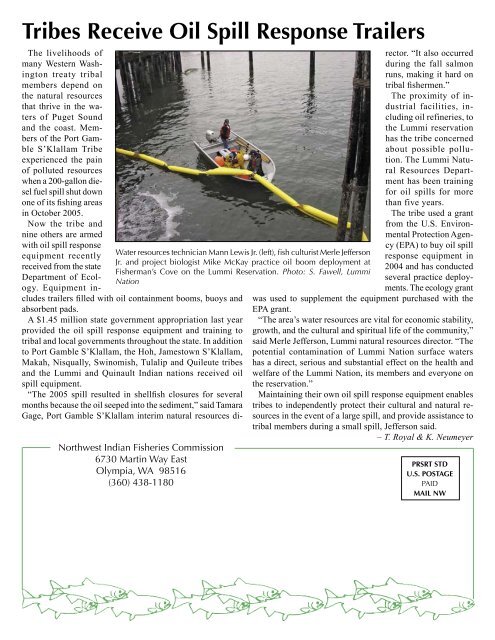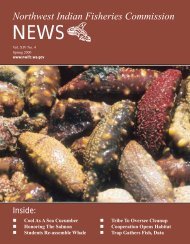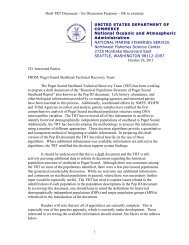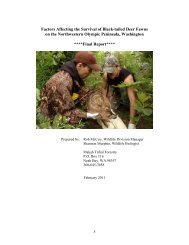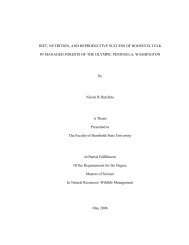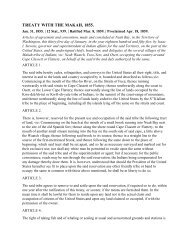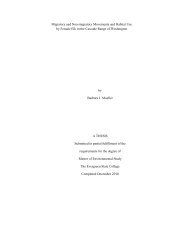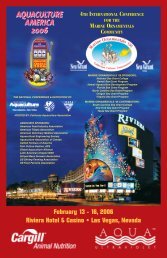NWIFC News - NWIFC Access - Northwest Indian Fisheries ...
NWIFC News - NWIFC Access - Northwest Indian Fisheries ...
NWIFC News - NWIFC Access - Northwest Indian Fisheries ...
You also want an ePaper? Increase the reach of your titles
YUMPU automatically turns print PDFs into web optimized ePapers that Google loves.
Tribes Receive Oil Spill Response Trailers<br />
The livelihoods of<br />
many Western Washington<br />
treaty tribal<br />
members depend on<br />
the natural resources<br />
that thrive in the waters<br />
of Puget Sound<br />
and the coast. Members<br />
of the Port Gamble<br />
S’Klallam Tribe<br />
experienced the pain<br />
of polluted resources<br />
when a 200-gallon diesel<br />
fuel spill shut down<br />
one of its fishing areas<br />
in October 2005.<br />
Now the tribe and<br />
nine others are armed<br />
with oil spill response<br />
equipment recently<br />
received from the state<br />
Department of Ecology.<br />
Equipment includes<br />
trailers filled with oil containment booms, buoys and<br />
absorbent pads.<br />
A $1.45 million state government appropriation last year<br />
provided the oil spill response equipment and training to<br />
tribal and local governments throughout the state. In addition<br />
to Port Gamble S’Klallam, the Hoh, Jamestown S’Klallam,<br />
Makah, Nisqually, Swinomish, Tulalip and Quileute tribes<br />
and the Lummi and Quinault <strong>Indian</strong> nations received oil<br />
spill equipment.<br />
“The 2005 spill resulted in shellfish closures for several<br />
months because the oil seeped into the sediment,” said Tamara<br />
Gage, Port Gamble S’Klallam interim natural resources director.<br />
“It also occurred<br />
during the fall salmon<br />
runs, making it hard on<br />
tribal fishermen.”<br />
The proximity of industrial<br />
facilities, including<br />
oil refineries, to<br />
the Lummi reservation<br />
has the tribe concerned<br />
about possible pollution.<br />
The Lummi Natural<br />
Resources Department<br />
has been training<br />
for oil spills for more<br />
than five years.<br />
The tribe used a grant<br />
from the U.S. Environmental<br />
Protection Agency<br />
(EPA) to buy oil spill<br />
response equipment in<br />
2004 and has conducted<br />
several practice deployments.<br />
The ecology grant<br />
was used to supplement the equipment purchased with the<br />
EPA grant.<br />
“The area’s water resources are vital for economic stability,<br />
growth, and the cultural and spiritual life of the community,”<br />
said Merle Jefferson, Lummi natural resources director. “The<br />
potential contamination of Lummi Nation surface waters<br />
has a direct, serious and substantial effect on the health and<br />
welfare of the Lummi Nation, its members and everyone on<br />
the reservation.”<br />
Maintaining their own oil spill response equipment enables<br />
tribes to independently protect their cultural and natural resources<br />
in the event of a large spill, and provide assistance to<br />
tribal members during a small spill, Jefferson said.<br />
– T. Royal & K. Neumeyer<br />
Water resources technician Mann Lewis Jr. (left), fish culturist Merle Jefferson<br />
Jr. and project biologist Mike McKay practice oil boom deployment at<br />
Fisherman’s Cove on the Lummi Reservation. Photo: S. Fawell, Lummi<br />
Nation<br />
<strong>Northwest</strong> <strong>Indian</strong> <strong>Fisheries</strong> Commission<br />
6730 Martin Way East<br />
Olympia, WA 98516<br />
(360) 438-1180<br />
PRSRT STD<br />
U.S. POSTAGE<br />
PAID<br />
MAIL NW


